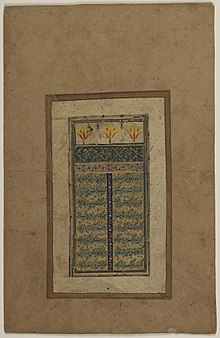ਬੋਸਤਾਨ (ਸਾਦੀ)

ਬੋਸਤਾਂ (ਫ਼ਾਰਸੀ: بوستان) ਸ਼ੇਖ ਸਾਦੀ ਸ਼ੀਰਾਜ਼ੀ ਦੀ ਮਸ਼ਹੂਰ ਲਿਖਤ (1257) ਜਿਸ ਵਿੱਚ ਅਖ਼ਲਾਕੀ ਮਸਲੇ ਹਿਕਾਇਤਾਂ ਦੇ ਰੂਪ ਵਿੱਚ ਨਜ਼ਮ ਕੀਤੇ ਗਏ ਹਨ। ਬੋਸਤਾਨ ਸਾਦੀ ਦੇ ਦੋ ਵੱਡੇ ਕੰਮਾਂ ਵਿਚੋਂ ਇੱਕ ਮੰਨਿਆ ਜਾਂਦਾ ਹੈ। ਇਹ ਸਾਦੀ ਦਾ ਪਹਿਲਾ ਕੰਮ ਸੀ, ਅਤੇ ਇਸਦੇ ਸਿਰਲੇਖ ਦਾ ਅਰਥ ਹੈ "ਬਾਗ਼"। ਪੁਸਤਕ ਵਿੱਚ ਸਾਦੀ ਦੇ ਲੰਬੇ ਤਜਰਬਿਆਂ ਅਤੇ ਜੀਵਨ ਦੇ ਨਿਰਣਿਆਂ ਬਾਰੇ ਦੱਸਿਆ ਗਿਆ ਹੈ ਅਤੇ ਇਹ ਹਕਾਇਤਾਂ ਦੇ ਵਿਸ਼ਾਲ ਸੰਗ੍ਰਹਿ ਨਾਲ ਇਸ ਨੂੰ ਚਾਰ ਚੰਨ ਲਾਏ ਗਏ ਹਨ। ਇਸ ਵਿੱਚ ਸਾਦੀ ਦੀਆਂ ਯਾਤਰਾਵਾਂ ਦੇ ਵੇਰਵੇ ਅਤੇ ਮਨੁੱਖੀ ਮਨੋਵਿਗਿਆਨ ਦਾ ਉਸਦਾ ਵਿਸ਼ਲੇਸ਼ਣ ਸ਼ਾਮਲ ਹੈ। ਉਹ ਅਕਸਰ ਆਪਣੇ ਵੇਰਵਿਆਂ ਦਾ ਜ਼ਿਕਰ ਉਤਸ਼ਾਹ ਨਾਲ ਅਤੇ ਈਸਪ ਦੀਆਂ ਕਹਾਣੀਆਂ ਵਰਗੀ ਸਲਾਹ ਦੇ ਨਾਲ ਕਰਦਾ ਹੈ।[2]
ਇਹ ਲਿਖਤ ਦਸ ਅਧਿਆਇਆਂ ਵਿੱਚ ਵੰਡੀ ਗਈ ਹੈ।
- 1. ਅਦਲ
- 2. ਅਹਿਸਾਨ
- 3. ਇਸ਼ਕ
- 4. ਤਵਾਜ਼ੋ
- 5. ਰਜ਼ਾ
- 6. ਜਿਕਰ
- 7. ਤਰਬੀਅਤ
- 8. ਸ਼ੁਕਰ
- 9. ਤੌਬਾ
- 10. ਮੁਨਾਜਾਤ
ਇਹ ਕਿਤਾਬ ਦ ਗਾਰਡੀਅਨ ਅਖ਼ਬਾਰ ਦੇ ਅਨੁਸਾਰ ਹੁਣ ਤੱਕ ਦੀਆਂ 100 ਮਹਾਨ ਕਿਤਾਬਾਂ ਵਿੱਚੋਂ ਇੱਕ ਹੈ।[3] ਇਹ ਮਸਨਵੀ ਸ਼ੈਲੀ ਅਤੇ ਤੁਕਬੰਦ ਦੋਹੜਿਆਂ ਦੇ ਰੂਪ ਵਿੱਚ ਰਚੀ ਗਈ ਹੈ, ਅਤੇ ਇਹ ਪਹਿਲਾਂ ਅੰਗਰੇਜ਼ੀ ਵਿੱਚ ਅਨੁਵਾਦ ਕੀਤੀ ਗਈ ਸੀ।' ਡੈਨਿਅਲ ਹੈਵਰਟ ਨੇ 1688 ਵਿੱਚ ਇਸਦਾ ਡੱਚ ਵਿੱਚ ਅਨੁਵਾਦ ਕੀਤਾ ਸੀ।[4] ਹੁਣ ਤੱਕ ਇਸ ਪੁਸਤਕ ਦੇ ਅਨੇਕਾਂ ਮੁਖਤਲਿਫ਼ ਜ਼ਬਾਨਾਂ ਵਿੱਚ ਅਨੁਵਾਦ ਹੋ ਚੁੱਕੇ ਹਨ।
| ਇਹ ਲੇਖ ਅਧਾਰ ਹੈ। ਤੁਸੀਂ ਇਸਨੂੰ ਵਧਾਕੇ ਵਿਕੀਪੀਡੀਆ ਦੀ ਮੱਦਦ ਕਰ ਸਕਦੇ ਹੋ। |
ਹਵਾਲੇ
[ਸੋਧੋ]- ↑ This manuscript may have been produced in India during the 17th century. The page provides a praise of God as an appropriate incipit to the text. The first two lines read: "In the name of the Lord, Life-Creating, / The Wise One, Speech-Creating with the Tongue, / The Lord, the Giver, the Hand-Seizing, / Merciful, Sin-Forgiving, Excuse-Accepting." This page is typical of the first page of Persian poetical texts, with an ornamental panel at the top (sarloh) and the main text decorated by cloud band motifs and decorative illumination between the text and in the gutter separating each verse of poetry.
- ↑ Mozaffari, N., Siyanat, F., Khubanian, M.,Khansar, A. (2018). The Effects of Kindness in Saadi's Bustan. Theory and Practice in Language Studies. Vol 8, No 9.
- ↑ https://www.theguardian.com/world/2002/may/08/books.booksnews
- ↑ Iranian Studies in the Netherlands, J. T. P. de Bruijn, Iranian Studies, Vol. 20, No. 2/4, Iranian Studies in Europe and Japan (1987), 169.
